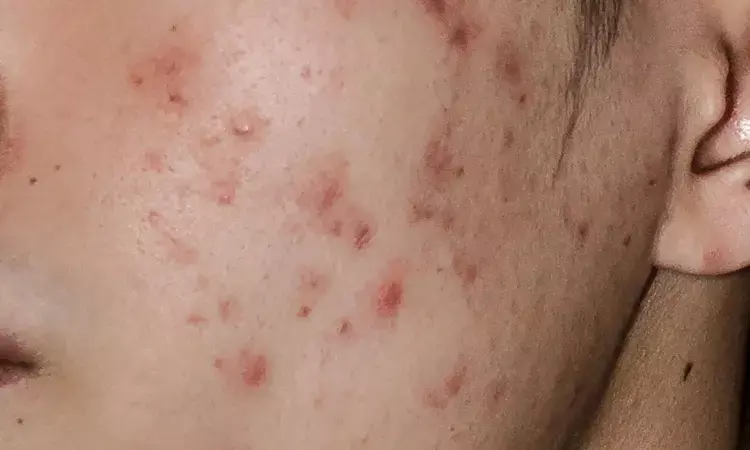- Home
- Medical news & Guidelines
- Anesthesiology
- Cardiology and CTVS
- Critical Care
- Dentistry
- Dermatology
- Diabetes and Endocrinology
- ENT
- Gastroenterology
- Medicine
- Nephrology
- Neurology
- Obstretics-Gynaecology
- Oncology
- Ophthalmology
- Orthopaedics
- Pediatrics-Neonatology
- Psychiatry
- Pulmonology
- Radiology
- Surgery
- Urology
- Laboratory Medicine
- Diet
- Nursing
- Paramedical
- Physiotherapy
- Health news
- Fact Check
- Bone Health Fact Check
- Brain Health Fact Check
- Cancer Related Fact Check
- Child Care Fact Check
- Dental and oral health fact check
- Diabetes and metabolic health fact check
- Diet and Nutrition Fact Check
- Eye and ENT Care Fact Check
- Fitness fact check
- Gut health fact check
- Heart health fact check
- Kidney health fact check
- Medical education fact check
- Men's health fact check
- Respiratory fact check
- Skin and hair care fact check
- Vaccine and Immunization fact check
- Women's health fact check
- AYUSH
- State News
- Andaman and Nicobar Islands
- Andhra Pradesh
- Arunachal Pradesh
- Assam
- Bihar
- Chandigarh
- Chattisgarh
- Dadra and Nagar Haveli
- Daman and Diu
- Delhi
- Goa
- Gujarat
- Haryana
- Himachal Pradesh
- Jammu & Kashmir
- Jharkhand
- Karnataka
- Kerala
- Ladakh
- Lakshadweep
- Madhya Pradesh
- Maharashtra
- Manipur
- Meghalaya
- Mizoram
- Nagaland
- Odisha
- Puducherry
- Punjab
- Rajasthan
- Sikkim
- Tamil Nadu
- Telangana
- Tripura
- Uttar Pradesh
- Uttrakhand
- West Bengal
- Medical Education
- Industry
Trifarotene cream may reduce acne-induced post-inflammatory hyperpigmentation across all skin types: Study

Researchers have found in a recent study that trifarotene combined with a skincare regimen significantly improves acne-induced hyperpigmentation (AIH) in patients with moderate acne vulgaris (AV). A recent phase IV clinical trial demonstrates that integrating trifarotene with a holistic skincare approach not only enhances the management of acne but also contributes to noticeable improvements in hyperpigmentation. This study was published in the International Journal of Dermatology by Andrew A. and colleagues.
Acne vulgaris (AV) frequently results in acne-induced hyperpigmentation (AIH), a condition that can persist even after the resolution of active acne. Trifarotene, a topical retinoid, has shown promise in addressing pigmentation issues associated with acne. This study aimed to evaluate the effectiveness of trifarotene in combination with a skincare regimen—which includes a moisturizer, cleanser, and sunscreen—compared to a vehicle treatment alone, over a 24-week period.
This double-blind, parallel-group phase IV study involved 123 participants aged 13–35 years with moderate AV and AIH. The study consisted of two treatment arms: one with 50 μg/g trifarotene cream and a skincare regimen. The outcome measures adopted were AIH overall disease severity and post-acne hyperpigmentation index, acne lesion counts, and patient-reported outcomes. Standard safety assessments were also made.
The key findings of the study were as follows:
• At Week 12, trifarotene significantly improved from baseline in ODS score (−1.6 vs. −1.1, P = 0.03). At Week 24, both were similar, forming the primary endpoint.
• At Week 24, the mean change in PAHPI score demonstrated a greater decrease with trifarotene versus vehicle (−18.9% vs. −11.3%, P < 0.01).
• It had been observed that at week 12, the change in acne lesion counts was more reduced with trifarotene than with the vehicle, and at week 24, the reduction showed statistically significant results with (P < 0.05).
• At weeks 12 and 24, with trifarotene, higher success rates were observed, which showed statistically considerable results where the (p< 0.05).
• The patients responded that the contraceptive regimen contributed to reduced irritation, which has facilitated better adherence to the treatment protocol.
• Improvement in pigmentation and erythema was observed in all types of skin.
• AEs occurred more frequently in the vehicle group, 30.2%, than in patients who were treated with trifarotene (16.7%).
The findings of the study confirmed that trifarotene, in association with a complete skincare regiment, has remarkable benefits in the management of acne-induced hyperpigmentation. That means evidence of effectiveness of the combination was reflected in the improved ODS and PAHPI scores, reduction in the number of lesions, and adequate satisfaction among the patients. Moreover, lesser adverse events by trifarotene make it even more safe for the management of acne and its related pigmentary disorders.
In summary, trifarotene with skincare was more effective and better tolerated in acne-induced hyperpigmentation than vehicle treatment. The study thus supports the use of trifarotene in multifaceted acne management strategies for the improvement of patient outcome and satisfaction measures.
Reference:
Alexis, A., Del Rosso, J. Q., Forman, S., Martorell, A., Browning, J., Laquer, V., Desai, S. R., York, J. P., Chavda, R., Dhawan, S., Moore, A. Y., & Stein-Gold, L. (2024). Importance of treating acne sequelae in skin of color: 6‐month phase IV study of trifarotene with an appropriate skincare routine including UV protection in acne‐induced post‐inflammatory hyperpigmentation. International Journal of Dermatology, 63(6), 806–815. https://doi.org/10.1111/ijd.17189
Dr Riya Dave has completed dentistry from Gujarat University in 2022. She is a dentist and accomplished medical and scientific writer known for her commitment to bridging the gap between clinical expertise and accessible healthcare information. She has been actively involved in writing blogs related to health and wellness.
Dr Kamal Kant Kohli-MBBS, DTCD- a chest specialist with more than 30 years of practice and a flair for writing clinical articles, Dr Kamal Kant Kohli joined Medical Dialogues as a Chief Editor of Medical News. Besides writing articles, as an editor, he proofreads and verifies all the medical content published on Medical Dialogues including those coming from journals, studies,medical conferences,guidelines etc. Email: drkohli@medicaldialogues.in. Contact no. 011-43720751


